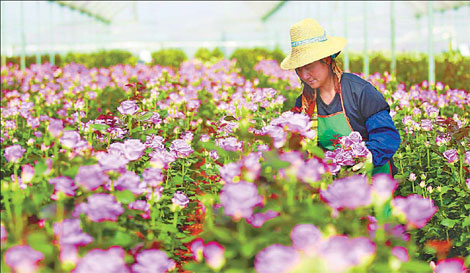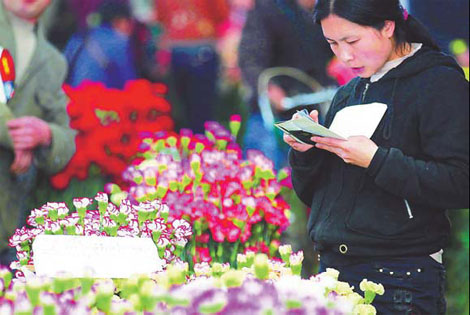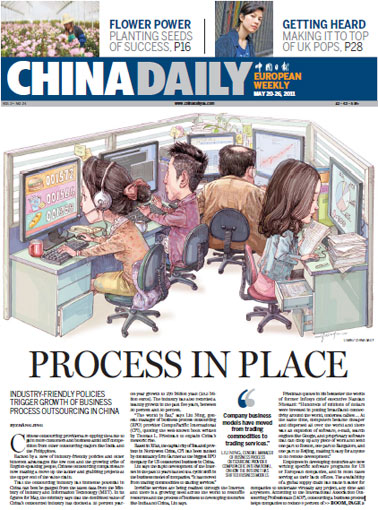Society
Flower power
Updated: 2011-05-24 07:54
By Li Yingqing and Yang Yang (China Daily)
|
A hothouse of a local flower grower in Yunnan. The province's flower yield was about 6 billion in 2010. Photos by Cui Meng / China Daily |
Blooms from the nation's floriculture hub in Yunnan seldom reach major consumption areas such as Western Europe or North America, and the main reason for this is logistics. Li Yingqing and Yang Yang report.
Cool and sporadic April rain falls on Kunming at 2 am. Most residents in the capital of Southwest China's Yunnan province are fast asleep at this time - except for those along the road leading up to the city's Dounan Flower Market - the largest in Asia - in Chenggong county about an hour's drive from downtown. Kong Weihu, 23, is one of the countless motorists waiting in cars, vans and other vehicles on the congested road. "There's always a traffic jam here at this time," he says. Every morning, Kong drives thousands of freshly cut flowers from his 6.6 hectares of hothouses 50 kms from the market. On this trip, he has more than 20,000 carnations in the van.
Dealers will buy his flowers and transport them to various cities, and to Japan and South Korea. If the price is good, Kong may rake in more than 20,000 yuan ($3,077).
Kong is just one of the thousands of flower traders in the market. Every morning, the millions of the flowers sent from the market through Kunming account for 80 percent of the flowers sold in more than 70 Chinese cities, Yunnan provincial agricultural department figures show.
In 2010 alone, 4.7 billion fresh flowers were traded here, with the total transaction value reaching 3.4 billion yuan, says Huo Ran, deputy general manager of China Kunming Dounan Flower Industrial Park Development Co Ltd, which owns the Dounan Flower Market. About 85 percent of China's new flower varieties will also be "tested" in the market, Huo says.
More than 40 countries and regions, including Japan, United Arab Emirates and Thailand, receive flowers from this market, Huo says.
Many consider Dounan market to be a bellwether of Yunnan's blooming flower industry.
During the 11th Five-Year Plan period (2006-2010), the area for growing the flowers in Yunnan province grew to 42,000 hectares in 2010 from 16,000 hectares in 2005, provincial agricultural department figures show.
The province's flower yield grew to 6.05 billion from 3.6 billion, leading China's flower industry in 17 consecutive years. The total annual income of the growers in Yunnan rose from less than 2 billion yuan in 2005 to 6 billion yuan in 2010, while their total output value rose from 5 billion yuan to 232 billion yuan, according to the department. In 2010, the export sales of Yunnan's flower industry tripled to $150 million from $50 million in 2005.
While the province boasts the country's largest flower yield and leads the domestic market, it still faces difficulties in entering the international market, especially Europe, which mirrors the export situation of China's flower industry.
"Although China's flower yield accounts for 40 percent of the world's total, our export share in the international market is merely 2 percent," Huo says.
Yunnan's flowers are exported to neighboring countries and regions but seldom reach Western Europe and North America, the two major consumption regions for fresh flowers.
"The biggest problem for exporting flowers from Yunnan is logistics," He Kui, deputy director of Yunnan's flower industry office, says.
About 95 percent of Yunnan's floriculture products are transported by air, Huo says.
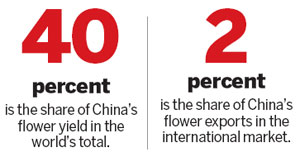
"Transportation of fresh flowers via air hampers our exploration into the European market for two reasons," He says.
"One is that the transport costs are so high that there are no decent profits left for growers or dealers."
Leading rose producer Kunming Yang Chinese Rose Gardening Co Ltd used to export flowers to Australia and Europe. But after the financial crisis, its export destinations decreased to only Japan and South Korea.
"One of the most important reasons for the change is that transport costs are climbing so high with soaring energy prices," the company's president Yang Yuyong says.
The proportion of the company's sales made out of exports has declined from 60 to 70 percent before the financial crisis to 10 percent in 2010.
Kunming Hongri Flower Plant Co Ltd, another flower company in the province, exports lilies, carnations, roses, African daisies and chrysanthemums to Japan, South Korea, Thailand and Dubai. All its products are transported by air.
"If the export sales are $400,000, half will go to logistics," the company's export manager Zhao Lu says.
He Kui also points to irregular flights affecting Yunnan's flower exports. Freshly cut flowers headed for Europe have to be transferred from Bangkok because Kunming's airport has no direct flights.
"Instead of special cargo planes, we usually transport freshly cut flowers on airliners. The flower quality cannot be guaranteed, because the differences between ground and air temperature are big," He says.
"Sometimes there is no space on the airliners, so the flowers have to wait in Bangkok. As a result, customers cannot receive high-quality flowers on time".
Compared with the Netherlands, the largest flower exporter, Yunnan's flower industry also falls behind in the development of new high-quality species, flower preservation techniques and packing.
"Without these advantages, the flowers cannot maintain high quality and freshness before reaching their destinations and cannot sell at good prices in overseas markets," He says.
In recent years, local companies have tried to close the gap by cooperating with the Yunnan Academy of Agriculture Sciences in the research and development of new flower varieties and preservation techniques.
By the end of 2010, Yunnan had bred 145 new flower varieties - 80 percent of the country's total. Among them, 54 had been granted with plant variety protection rights and three had gained recognition in the international market, a recent Yunnan flower industry office report says.
In his 20-hectare planting base, two hour's drive from downtown Kunming, Yang Yuyong proudly introduces the improved rose varieties he has bred.
"There are more than 500 fine varieties of roses collected from all around the world being grown here," Yang says.
"Our job is to develop better ones by making hybrids from existing kinds."
Yang also introduced tropical plants, such as protea from South Africa, into his testing fields. A protea flower sells for 5 euros ($7) at wholesale prices in Europe and 120 yuan ($18) in Hangzhou, capital of East China's Zhejiang province.
"Because the price is so high, we can make a good profit by exporting protea to Europe even with the high logistics costs," Yang says. He plans to export protea to Europe in the near future.
But more needs to be done for the local producers to compete globally.
"The biggest challenge to Yunnan flowers' future entry into the European market might be technical barriers to trade in terms of environmental protection," He Kui says.
In the late 1990s, growing flowers was also blamed for polluting Dianchi Lake, 7.8 km from Dounan Flower Market. As a result, the government in 2008 banned farming flowers within 3 km around the lake, although the Food and Agriculture Organization of the United Nations concluded the pollution's source was sewage from Kunming.
Environmental protection now involves the whole flower growing process - breeding, growing, packaging, transporting, preserving and disposing of waste.
"First, we should select fine varieties of flowers that are highly resistant to diseases, pests and low temperatures to decrease the use of pesticides and carbon emissions from heating systems," says Wang Jishi, director of the Institute of Flowers at the Yunnan Academy of Agricultural Sciences.
As for production and trading, many say Yunnan can borrow from the experience of foreign countries.
|
Dealers at the Kunming Dounan Flower Market, the largest of its kind in Asia. |
E-paper
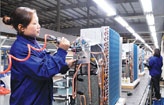
Thawing out
After a deep freeze in sales during the recession, China’s air conditioner makers are bouncing back
Cool Iron lady
Of good and evil
Build on security initiatives
Specials

Memory lanes
Shanghai’s historic ALLEYS not just unique architecture but a way of life

Great expectations
Hong Kong-born singer songwriter rises to the top of the UK pops.

A diplomat of character
Belgian envoy draws on personal fascination to help build China ties.
